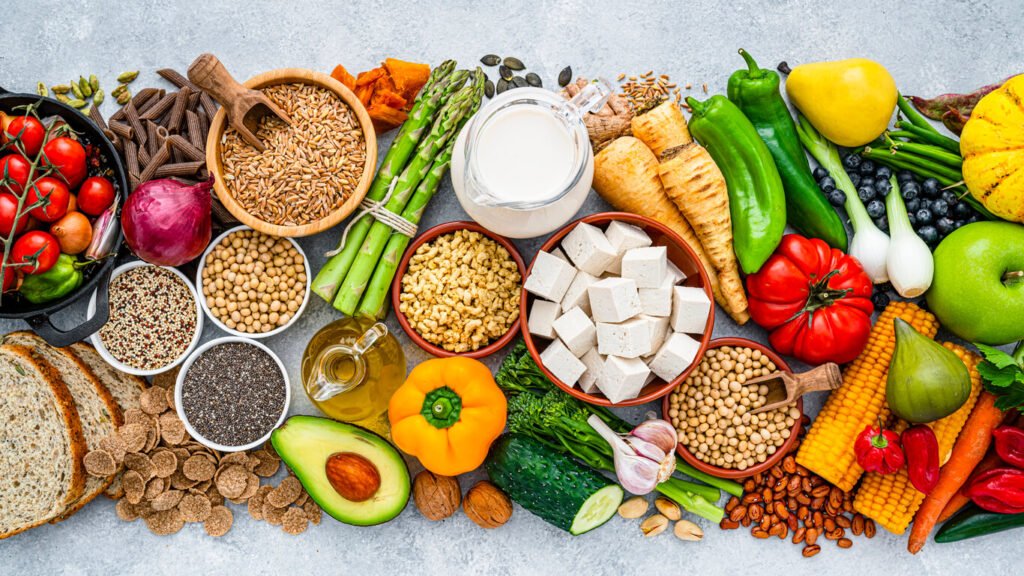It’s that time of year again!
Veganuary is an annual challenge that started in 2014, encouraging people to give up meat, fish and dairy and adopt a vegan lifestyle for the month of January.
More than 700,000 people officially signed up for the challenge in 2023, and now—on the tenth anniversary of this plant-based tradition, we caught up with nutrition expert Phil Holmes on how golfers can make the switch to vegan living.
Phil talks us through the best vegan snacks for golfers, some general vegan dietary advice, and how to shape a plant-based lifestyle around your golf.
Veganuary for golfers

The night before a round
The night before a round should
ideally be alcohol-free, and you should ‘carb up’, too. Golf is essentially a
four-hour game nowadays, so the secret to success is getting off to a good
start with your energy.
For vegans, ‘carbing up’ is simple; you can still eat rice and you can still eat most pasta (some fresh pasta will contain egg, so always check the labels).
Rice is arguably better because it’s almost certainly going to be dairy-free. Brown rice, pasta and bread are good choices and better for you than their white alternatives, as the energy release takes longer.

If you have white rice, you’ll have an energy spike and crash afterwards, but if you have brown rice instead, the energy is slower-releasing and will stay around longer.
Ultimately, the night before playing
golf, you don’t want to eat something that will stay in your system the next
morning and impact your game. If your body doesn’t have to work as hard or
stress as much, it can digest your food much easier. You should also sleep
better, which means you’ll wake up with higher energy levels and be ready to
go. This is one of the main reasons why if you drink alcohol in the evening, you’ll
have a restless sleep.
Science tells us that with alcohol, you don’t get to the fourth stage of sleep, which is where the real rich and restorative part of your sleep is.
Tea time
Dishes like chilli or carbonara can easily be made vegan and are good choices for an evening meal before playing golf the next day.

Take carbonara, for example—instead of using eggs, you can make the sauce from nuts. Nuts are very popular among vegans because their creaminess and fat content make them a good base for sauces. You can throw some cashew nuts or almonds into a blender with garlic and water and whip up a paste to turn into a rich sauce for your dish.
I’ve worked with vegans who absolutely swear by cashew nuts!
Ingredients like mushrooms and paprika are also your friends when it comes to flavouring dishes like vegan carbonara or chilli.
First-time vegans
The vegan section on the BBC Food website is a very useful resource for first-time vegans or those participating in Veganuary.
One of the most commonly cited ‘disadvantages’ of a vegan diet is the seeming lack of protein compared to a meat-rich diet. However, this needn’t be the case.
Vegans can still get the required protein intake by mixing things up a bit. Take chilli again, for example—kidney beans are an excellent source of protein, and you can also use other types of beans in a chilli, too.

Beans are part of the pulse family, so mixing them with wholewheat from things like rice or bread in your chilli dish can maximise your protein consumption.
The one plant-based ingredient that
breaks the mould, if you like, is soya. Tofu is derived from soya and provides
a complete protein. Many people—including non-vegans—eat tofu instead of meat in
dishes such as curries or stir-fries, for example.
High-carb meals such as stir-fries are great the night before playing golf, as they’ll get your carb stores nicely loaded and ready. You want high levels of glycine in your system the next day, which can be released as glucose when your muscles demand it. The tofu will also ensure you’ve got enough protein on board.

Note: Good quality tofu should be quite dry. Cheaper tofu can often be wet and may require pressing and drying out yourself before cooking.
On the morning of your round, you’ll want to ‘carb up’ again at breakfast, so that could be porridge, for example. Plant-based milks such as almond, oat or soya can make for a nice-tasting porridge. I would recommend using either oat or almond milk, as soya milk can sometimes leave an aftertaste when used in porridge.
Many vegans won’t touch honey and will instead use maple syrup to sweeten porridge. Vegan pancakes are another good, tasty breakfast option, and you can choose your toppings, too. Fresh fruit such as strawberries, blueberries and raspberries are great on pancakes and will give you a nice energy boost as you head to the course.
Vegan snacks: During the round

You’ll want to make sure you’ve got
some vegan snacks to hand during your round. Fruit is an obvious choice, but I
would try to limit fruit consumption while playing, as the fibre overload can
lead to more frequent trips to the loo, which is far from ideal when you’re out
on the course.
If you really do want to snack on fruit while playing golf, though, I’d suggest having an apple or a banana during the first five or six holes and leaving it at that.
Vegan snacks for golfers
Brands like Soreen do mini malt loaves in various flavours, which are vegan-friendly and perfect for golfers. You could, of course, buy a full-size loaf and chop it up yourself and spread on some vegan butter, but with the snack size lunchbox loaves, it’s really easy to chuck three or four pre-wrapped ones into your golf bag and eat them when you feel like it.
Trek bars are the same. Though its original oat flapjack is not vegan, there are plenty of vegan options available—some with dairy-free chocolate!
The fruit and nut mixed bags you can buy from supermarkets are also very handy. A handful of this can be very useful down the back nine, as the nuts will provide protein for your muscle recovery.

You can also make your own vegan flapjacks to take with you. All you have to do is use a dairy-free vegan butter instead of a standard dairy-based one.
I like to adopt a 4-10-14 pattern out on the golf course. This means grabbing a snack on the 4th, 10th and 14th holes. By the time you reach the 4th hole, you’ll be just coming out of your breakfast glucose release, so you will need an energy top-up. If you’re going to skip the ‘halfway house’ due to its lack of vegan options, then get your next snack in on the 10th tee before another on the 14th to see you through the last holes.
Vegan snacks: After the round

When you get back home after your
round, it’s wise to get some more protein in to aid your recovery. This could be
a bowl of homemade, protein-rich soup or a pasta-based dish.
Oat cakes or peanut butter on toast are also good vegan snacks to have when you’ve finished playing. Peanut butter, in particular, is good to start your protein recovery.
Most people aren’t that athletic in the way they swing a golf club, but we’re still putting our bodies through stress that we wouldn’t ordinarily have from Monday to Friday. We experience a different kind of stress on a course to the stress we would normally have during a working week, so your muscles have to recover from this. This is where you need your vegan protein.

One last thing I would recommend is ginger and turmeric shots. Ginger is a good source of Vitamin C and antioxidants, which will help you keep colds and illness at bay, while turmeric can help ease joint aches and pains.
About Phil Holmes
Phil is a nutrition advisor with over 20 years’ experience as a PE teacher. He works with aspiring athletes and teams and is an author/columnist on nutrition.
www.phsportsnutrition.co.uk
Giving some vegan snacks a go while playing golf this year? You may want to consider protecting yourself and your gear, too.
With Golf Care, policies include Equipment Cover up to £7,500 and Public Liability up to £10m so you can worry less and concentrate on your game more.
Click on the banner below to learn more and get a quote.
![]()


